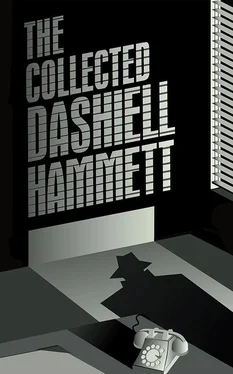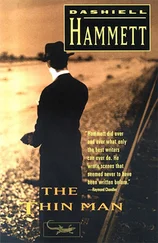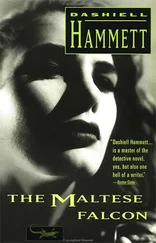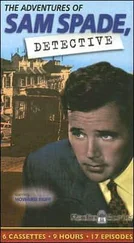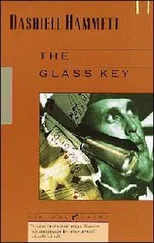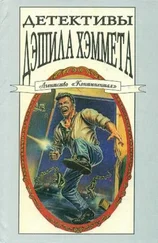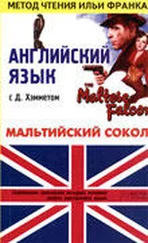“I drop in home to pick up a couple of things before I scram and that call of Hammill’s catches me and I fall for it plenty. I figure I’m getting a break. I figure you’re not on yet and are going to send me back to New York as the Detroit hood again to see what dope I can get out of these folks, and I’ll be sitting pretty. Well, you fooled me, brother, or didn’t — Listen, Scott, you didn’t just stumble into that accidentally, did you?”
“No. Furman had to be murdered by a copper. A copper was most likely to know reward circulars well enough to make a good job of forging one. Who printed that for you?”
“Go on with your story,” he said. “I’m not dragging anybody in with me. It was only a poor mug of a printer that needed dough.”
“Okay. Only a copper would be sure enough of the routine to know how things would be handled. Only a copper — one of my coppers — would be able to walk into his cell, bang him across the head, and string him up on the — Those bruises showed.”
“They did? I wrapped the blackjack in a towel, figuring it would knock him out without leaving a mark anybody’d find under the hair. I seem to’ve slipped up a lot.”
“So that narrows it down to my coppers,” I went on, “and — well — you told me you knew the Randall woman, and there it was, only I figured you were working with them. What got you into this?”
He made a sour mouth. “What gets most saps in jams? A yen for easy dough. I’m in New York, see, working on that Dutton job for you, palling around with gamblers, and racketeers, passing for one of them; and I get to figuring that here my work takes as much brains as theirs, and is as tough and dangerous as theirs, but they’re taking in big money and I’m working for coffee and doughnuts. That kind of stuff gets you.
“Then I run into this Ethel and she goes for me like a house afire. I like her, too, so that’s dandy; but one night she tells me about this husband of hers and how much dough he’s got and how nuts he is about her and how he’s still trying to find her, and I get to thinking. I think she’s nuts enough about me to marry me. I still think she’d marry me if she didn’t know I killed him. Divorcing him’s no good, because the chances are she wouldn’t take any money from him and, anyway, it would only be part. So I got to thinking about suppose he died and left her the roll.
“That was more like it. I ran down to Philly a couple of afternoons and looked him up and everything looked fine. He didn’t even have anybody else close enough to leave more than a little of his dough to. So I did it. Not right away; I took my time working out the details, meanwhile writing to her through a fellow in Detroit.
“And then I did it. I sent those circulars out — to a lot of places — not wanting to point too much at this one. And when I was ready I phoned him, telling him if he’d come to the Deerwood Hotel that night, some time between then and the next night, he’d hear from Ethel. And, like I thought, he’d’ve fallen for any trap that was baited with her. You picking him up at the station was a break. If you hadn’t, I’d’ve had to discover he was registered at the hotel that night. Anyway, I’d’ve killed him and pretty soon I’d’ve started drinking or something, and you’d’ve fired me and I’d’ve gone off and married Ethel and her half-million under my Detroit name.” He made the sour mouth again. “Only I guess I’m not as sharp as I thought.”
“Maybe you are,” I said, “but that doesn’t always help. Old man Kamsley, Ben’s father, used to have a saying, ‘To a sharp knife comes a tough steak.’ I’m sorry you did it, Wally. I always liked you.”
He smiled wearily. “I know you did,” he said. “I was counting on that.”
Collier’s, February 17, 1934
I knew what a lot of people said about Loney but he was always swell to me. Ever since I remember he was swell to me and I guess I would have liked him just as much even if he had been just somebody else instead of my brother; but I was glad he was not just somebody else.
He was not like me. He was slim and would have looked swell in any kind of clothes you put on him, only he always dressed classy and looked like he had stepped right out of the bandbox even when he was just loafing around the house, and he had slick hair and the whitest teeth you ever saw and long, thin, clean-looking fingers. He looked like the way I remembered my father, only better-looking. I took more after Ma’s folks, the Malones, which was funny because Loney was the one that was named after them. Malone Bolan. He was smart as they make them, too. It was no use trying to put anything over on him and maybe that was what some people had against him, only that was kind of hard to fit in with Pete Gonzalez.
Pete Gonzalez not liking Loney used to bother me sometimes because he was a swell guy too, and he was never trying to put anything over on anybody. He had two fighters and a wrestler named Kilchak and he always sent them in to do the best they could, just like Loney sent me in. He was the topnotch manager in our part of the country and a lot of people said there was no better anywhere, so I felt pretty good about him wanting to handle me, even if I did say no.
It was in the hall leaving Tubby White’s gym that I ran into him that afternoon and he said, “Hello, Kid, how’s it?” moving his cigar farther over in a corner of his mouth so he could talk.
“Hello. All right.”
He looked me up and down, squinting on account of the smoke from his cigar. “Going to take this guy Saturday?”
“I guess so.”
He looked me up and down again like he was weighing me in. His eyes were little enough anyhow and when he squinted like that you could hardly see them at all. “How old are you, Kid?”
“Going on nineteen.”
“And you’ll weigh about a hundred and sixty,” he said.
“Sixty-seven and a half. I’m growing pretty fast.”
“Ever see this guy you’re fighting Saturday?”
“No.”
“He’s plenty tough.”
I grinned and said, “I guess he is.”
“And plenty smart.”
I said, “I guess he is,” again.
He took his cigar out of his mouth and scowled at me and said like he was sore at me, “You know you got no business in the ring with him, don’t you?” Before I could think up anything to say he stuck the cigar back in his mouth and his face and his voice changed. “Why don’t you let me handle you, Kid? You got the stuff. I’ll handle you right, build you up, not use you up, and you’ll be good for a long trip.”
“I couldn’t do that,” I said. “Loney taught me all I know and—”
“Taught you what?” Pete snarled. He looked mad again. “If you think you been taught anything at all you just take a look at your mug in the next looking-glass you come across.” He took the cigar out of his mouth and spat out a piece of tobacco that had come loose. “Only eighteen years old and ain’t been fighting a year and look at the mug on him!”
I felt myself blushing. I guess I was never any beauty but, like Pete said, I had been hit in the face a lot and I guess my face showed it. I said, “Well, of course, I’m not a boxer.”
“And that’s the God’s truth,” Pete said. “And why ain’t you?”
“I don’t know. I guess it’s just not my way of fighting.”
“You could learn. You’re fast and you ain’t dumb. What’s this stuff getting you? Every week Loney sends you in against some guy you’re not ready for yet and you soak up a lot of fists and—”
“I win, don’t I?” I said.
“Sure you win — so far — because you’re young and tough and got the moxie and can hit, but I wouldn’t want to pay for winning what you’re paying, and I wouldn’t want any of my boys to. I seen kids — maybe some of them as promising as you — go along the way you’re going, and I seen what was left of them a couple years later. Take my word for it, Kid, you’ll do better than that with me.”
Читать дальше
